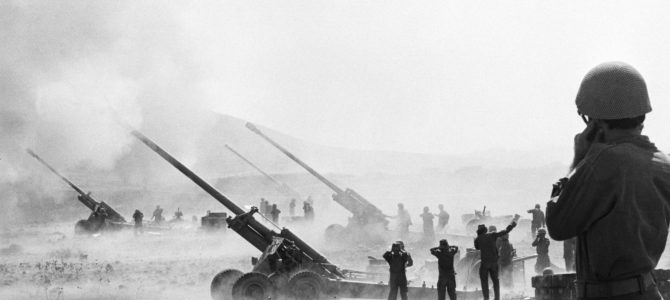
Most mainstream press coverage of the Six Day War’s 50th anniversary has focused more on the legacy of the conflict than on the events of 1967. That Israel still retains control of what was then called the “West Bank” of the Kingdom of Jordan, and a united rather than divided Jerusalem (as it had been from 1949 to 1967), is fodder for endless discussions about how best to end the stalemate that has left Israel in control of the territories it won in that defensive war. But in a remarkable digression from the ocean of laments about the evils of occupation, the New York Times published a front-page feature in their Sunday edition detailing the story of something that didn’t happen: an Israeli use of a nuclear weapon.
The story, titled “The Last Secret” of the 1967 war, centers on the claim that Israel actively considered a plan to detonate a nuclear bomb in the Sinai Peninsula to deter war, or to stop it if the tide of battle turned against them. Based on a single source, the tale is one of both Israeli desperation and of potential recklessness, in which a nuclear explosion would be used as a warning rather than as an attempt to take out an enemy army, let alone a population center.
The source was retired General Itzhak Yaakov, who was the chief of weapons development for the Israel Defense Forces in the late 1960s and the early 1970s, and as such was the liaison between the military and the country’s nuclear program. According to Yaakov, he drafted and promoted a complicated and dangerous plan for a nuclear demonstration on the eve of the 1967 war. It would have involved inserting Israeli forces behind Egyptian lines, inserting a nuclear weapon on a mountain, and establishing a command post in the area from which the bomb would have been detonated. The idea resembled the proposal mooted by some of those who worked on America’s Manhattan Project, which called for using the first nuclear weapons to warn Japan rather than to drop them on Hiroshima and Nagasaki as the U.S. sought to end the Second World War.
But rather than risk the international opprobrium that would have ensued from the use of a nuclear weapon whose existence it denied then, as it officially does now, Yaakov’s idea was ignored by his superiors. Though Israel was cautioned by Western powers to be patient, it did not choose to sit back and wait to be attacked by the armies massing on their vulnerable borders. Israel struck first in June 1967 and achieved a stunning and historic victory. Nevertheless, like others enraptured by the projects they head, Yaakov continued to advocate for a nuclear demonstration even after the war, and spent the rest of his life believing his foolhardy proposal a good idea.
Though bound by military secrecy, in retirement Yaakov apparently spoke about his plan to a reporter and wound up being prosecuted for this breach of security at the age of 75 in 2001. He died in 2013, but not before again speaking about the topic to historian Avner Cohen, whose writing is the source for the Times story.
Lessons From The Six Day War
Not everyone is buying Yaakov’s account. Michael Oren, former Israeli Ambassador to the United States and a historian who wrote the definitive account of the Six Day War, discounts Yaakov’s story and says there is nothing in the voluminous government documents he’s reviewed to back it up.
Yet even if Yaakov is telling the truth about his proposal, it’s not clear what this “last secret” proves, other than to portray Israel as a potential nuclear offender in 1967 rather than as a small, besieged nation facing imminent peril. It was likely just one among many ideas being floated within the Israeli military on the eve of war and, like the huge archive of contingency plans that are forgotten as quickly as they are compiled in the Pentagon, very few in the IDF would have heard of it.
No one can know what Israel’s government would have done if joint Egyptian, Syrian, and Jordanian attacks had breached the country’s defenses. But then, as now, use of a nuclear weapon would have been problematic and not necessarily successful, if enemy armies made the short drive from the border to Tel Aviv and Haifa, let alone Israel’s capital in Jerusalem that was already divided and surrounded on three sides.
But even if this secret is at best a historical footnote, there are still some lessons to be learned from it.
The first is to remind the world that the conflict didn’t begin when Israel took possession of the West Bank. Prior to that war, the “occupied territories” that Muslim and Arab countries wished to “liberate” consisted of pre-June 1967 Israel. If some in the Israeli military were worried enough to even consider using nukes, it’s because the goal of its enemies wasn’t to adjust its borders or to create a Palestinian Arab state, since the lands now considered “Palestinian territories” were the property of Jordan and Egypt at the time of the war. Just as important, Israel’s army had to focus on offensive rather than defensive strategies because it was being asked to protect lines that were, as its then-foreign minister Abba Evan called them, “Auschwitz borders” that were a standing invitation to attack.
We Shouldn’t Undermine Israel’s Strength
Those who believe today that the only formula for peace is a full Israeli withdrawal back to the 1967 starting point are, in effect, asking the Jewish state to revert to that same situation today with the same, largely meaningless foreign guarantees. UN peacekeepers were on the border with the Sinai but meekly left when Egyptian dictator Gamal Abdul Nasser demanded their withdrawal in the weeks before the war.
Israel is far stronger today than it was in 1967 and has a strategic alliance with the United States that didn’t exist then. But rather than being faced by military dictatorships and a shaky Jordanian monarchy, it must worry about a potentially nuclear foe in Iran and Islamist terrorists like Hamas, which rules an independent Palestinian state in all but name in Gaza as well as Hezbollah in Lebanon and the overall threat of Islamist terror groups like ISIS and al Qaeda. Those who treat Israel’s security as an afterthought would do well to think back on the situation it faced in May 1967 when much of the world assumed a second Holocaust was possible, if not likely.
An Israel deprived of strategic depth, facing a world even more loath to allow the use of force against a likely unstable new state of Palestine, would likely be forced to abjure patience and return to a forced reliance on offensive strikes against its neighbors. Anyone that asks Israel to return to a situation in which its security rests on a such a narrow margin of error had better be offering full and complete peace, and not a mere truce with a border if it expects them to accept it.









